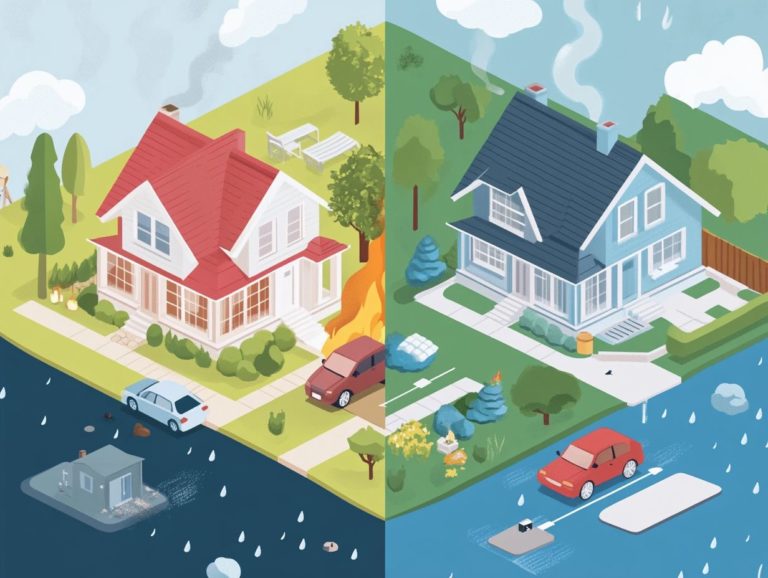Essential Home Insurance Types for New Buyers
Home insurance serves as a vital safety net for homeowners, providing essential protection against unforeseen events that could threaten your financial stability.
With various coverage options available, understanding your choices is crucial to selecting the policy that best suits your needs.
This article looks closely at the types of home insurance, key factors to consider when making your decision, and tips for saving on premiums.
It also highlights common pitfalls to avoid, ensuring you are well-prepared to confidently navigate the landscape of home insurance.
Contents
Key Takeaways:

Consider your personal needs and budget when choosing a home insurance type that suits you. If you’re a first-time buyer, it’s helpful to understand what home insurance is and look into additional coverage options for extra protection. Act now to save on home insurance by bundling policies and increasing your deductible. Avoid common mistakes that can lead to costly consequences.
Understanding Home Insurance
Understanding home insurance is crucial for homeowners, as it offers protection against various risks and liabilities linked to property ownership. For first-time buyers, recognizing the importance of home insurance can be particularly beneficial.
With different insurance policies available, including homeowners insurance that covers dwelling, personal property, and liability, you can customize your insurance to fit your specific needs.
It’s important to know about different policy types like HO-1 (Basic), HO-2 (Broad), and HO-3 (Special). These policies define the scope of coverage for named perils and open perils, ensuring you achieve optimal protection for your home and belongings.
What is Home Insurance?
Home insurance provides financial protection against losses or damages to your dwelling and personal belongings. This coverage includes several key components critical for safeguarding your investment.
- Dwelling coverage: Covers the physical structure of your home.
- Personal property protection: Secures your valuables and belongings inside your home.
- Liability insurance: Protects you from potential lawsuits arising from injuries or damages on your property.
- Additional living expenses coverage: Helps maintain your standard of living while repairs are underway if unexpected issues render your home uninhabitable.
Understanding these elements is crucial, as it allows you to secure adequate coverage tailored to your specific needs.
Types of Home Insurance
You ll find various home insurance policies tailored to meet diverse needs and coverage levels, from the straightforward HO-1 policy to the more robust HO-5 options.
Each policy has its own features, whether it s coverage for named perils or open perils, allowing you to choose a plan that aligns with your circumstances and the risks you face as a homeowner.
Basic Coverage Options
Basic coverage options in home insurance typically provide essential protections such as dwelling, personal property, and liability coverage. For those looking to deepen their understanding, exploring the top considerations for home insurance types can help safeguard you against common threats to your assets and finances.
Dwelling coverage is crucial, as it protects against structural damage from perils like fire, wind, or vandalism. This means you can fix or rebuild your home without breaking the bank.
Meanwhile, personal property coverage secures your belongings inside the home from furniture to jewelry shielding you against theft or damage from unforeseen events. Liability coverage provides financial protection in case a visitor is injured on your property or if you face legal challenges.
Together, these options create a comprehensive safety net, allowing you to navigate the uncertainties of homeownership with confidence.
Additional Coverage Options

Additional coverage options in home insurance policies can elevate your protection by addressing various risks often overlooked in basic plans. This includes add-ons for additional living expenses and open peril coverage. These enhancements enable you to tailor your insurance to meet your unique needs.
For example, add-ons provide extra protection for valuable items like jewelry, artwork, or collectibles, ensuring they re well-covered against theft or damage. Many homeowners face distinct challenges from natural disasters; in certain regions, earthquakes and floods represent significant threats. Therefore, specialized coverage is essential.
Personal liability protection is also important, as it shields you from potential legal claims stemming from accidents on your property. Homeowners should regularly review and customize their policies to guarantee comprehensive coverage that aligns with their circumstances and provides peace of mind.
Factors to Consider When Choosing Home Insurance
When selecting home insurance, consider a range of critical factors. Assess your personal needs, the risk factors tied to your location, and understanding homeowners insurance types to explore the various policies available.
Understanding these elements can profoundly impact your decision-making process, helping you secure the most appropriate coverage for your home and assets.
Location and Risk Factors
The location of your home plays a crucial role in determining the type of coverage you need. Certain areas are more susceptible to risks like floods, earthquakes, or fires.
If your property is on the coast, you re likely facing heightened flood risks, potentially leading to higher premiums or the need for additional flood insurance. Conversely, if you live in an earthquake-prone region like California, specialized coverage could be necessary.
Local regulations also influence the availability and nature of your insurance options. In urban areas, crime-related risks can prompt a need for stronger theft and vandalism protection.
By assessing these environmental risks and understanding local regulations, you can secure the most suitable and financially savvy coverage for your home.
Personal Needs and Budget
Understanding your personal needs and budget is essential when choosing home insurance. To make an informed decision, consider how to choose the right home insurance type. These factors will guide you toward the right coverage levels and policy options tailored to your financial situation.
Your home’s value, the worth of your possessions, and your overall lifestyle significantly shape your insurance requirements. For instance, a family in a high-value home filled with valuable items will have different needs than someone in a modest apartment.
Take stock of your belongings and consider the risks associated with your living environment. Striking the right balance between adequate coverage and budget constraints can be challenging.
Get multiple quotes to compare options, often unveiling more affordable choices that maintain essential protection. Investing time to evaluate various policies is vital for achieving peace of mind.
How to Save on Home Insurance
You can achieve significant savings on home insurance through various strategies to lower your premiums while maintaining adequate coverage. This protects your investment without straining your budget.
By familiarizing yourself with available discounts and making informed decisions, you can effectively reduce your overall insurance costs.
Don t wait! Start reviewing your coverage options today, get quotes, and consult an agent for personalized advice.
Tips for Lowering Premiums

Lowering your home insurance premiums is entirely within your reach. With smart choices and lifestyle changes, you can boost your home’s security and minimize risks.
Take specific actions to make this goal a reality. For instance, installing security systems like cameras or alarms serves as a deterrent to potential break-ins. Plus, it can lead to discounts on your insurance rates.
Maintaining a robust credit score is essential, as insurers often consider it when determining premiums. Regularly review your coverage options to ensure you’re not overpaying for unnecessary protection and to uncover potential discounts.
Engage with insurance agents for tailored advice on these strategies. They can reveal personalized opportunities for additional savings.
Common Mistakes to Avoid with Home Insurance
Avoiding common mistakes with home insurance is crucial for ensuring that you are fully protected against potential losses and liabilities, especially considering the importance of home insurance for millennial buyers.
Being mindful of typical pitfalls helps you make informed decisions and select coverage tailored to your specific needs.
This proactive approach enables you to safeguard your home and financial well-being effectively.
Potential Pitfalls and How to Avoid Them
Recognizing potential pitfalls in home insurance is essential for homeowners who wish to avoid gaps in coverage that could lead to unexpected financial strains.
One common misconception is that standard policies automatically cover all perils; however, this is often not the case, leaving homeowners exposed to certain risks. Failing to include personal property can lead to significant losses in the event of a disaster.
As your life circumstances change whether it s welcoming a new family member or undergoing renovations it s crucial to reevaluate and adjust your insurance policies. Regularly assess your coverage needs and consult with your insurance agent to ensure that your policy remains comprehensive.
Keep an updated inventory of your personal belongings. This helps in making informed adjustments, offering you peace of mind and greater financial security.
Frequently Asked Questions
Wondering what home insurance types you need? Here are some essential FAQs!
-
What are the essential types of home insurance for new buyers?
The essential types of home insurance for first-time buyers include standard homeowners insurance, flood insurance, earthquake insurance, and personal liability insurance.
-
What does standard homeowners insurance cover?
Standard homeowners insurance typically covers damage to your home and personal belongings from events like fire, theft, and vandalism. It also provides liability coverage for accidents that occur on your property.
-
Do I need flood insurance?
If you live in an area prone to flooding, having flood insurance is highly recommended. Standard homeowners insurance does not typically cover flood damage.
-
Is earthquake insurance necessary?
It depends on where you live. If your area is at high risk for earthquakes, having earthquake insurance is recommended. Standard homeowners insurance does not cover earthquake damage.
-
What is personal liability insurance?
Personal liability insurance provides coverage if someone is injured on your property or you accidentally cause damage to someone else’s property. This coverage is crucial for protecting yourself from potential lawsuits.
-
How much coverage should I get for my home insurance?
The amount of coverage you need depends on various factors like the value of your home, personal belongings, and your budget. Carefully assess your needs and consult with an insurance agent to determine the appropriate coverage for your situation.







